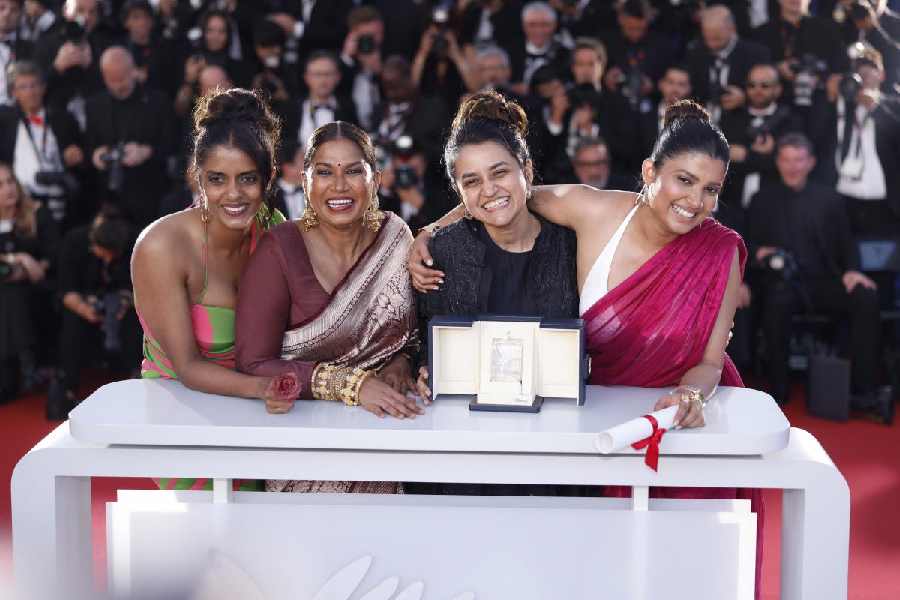It was a triple feat for Indian talent at the 2024 Cannes Film Festival with Payal Kapadia's "All We Imagine As Light", "Sunflowers Were the First Ones to Know" by FTII student Chidananda S Naik, and Anasuya Sengupta of "The Shameless" fame winning major awards in each of the three competitive sections of the prestigious gala.
The 77th edition of Cannes, which concluded on Saturday, was undoubtedly the best year for the country which found space at the fest through eight Indian, or India-themed, films.
Kapadia, an alumna of the Film & Television Institute of India (FTII), charted history by becoming the first Indian filmmaker to win the Grand Prix award for "All We Imagine as Light".
"Thank you, Cannes Film Festival for having our film here. Please don't wait 30 years to have another Indian film," she said in her speech.
The movie earned the honour, the second-most prestigious prize of the gala after the Palme d'Or, which went to American director Sean Baker for "Anora".
"All We Imagine as Light", a Malayalam-Hindi feature starring Kani Kusruti, Divya Prabha and Chhaya Kadam, revolves around three women in Mumbai who go on a road trip to a beach town.
Kapadia's movie, her feature directorial debut, is the first Indian film in 30 years and first ever by an Indian female director to be showcased in main competition, last being Shaji N Karun's "Swaham" (1994).
That "All We Imagine As Light" will win an award became almost certain when it received glowing reviews following its premiere, with some international critics describing it as a "portrait of urban connection" and "poetic meditation" as well as comparing Kapadia's work to that of masters like Satyajit Ray and Wong Kar Wai.
Though the second most prestigious prize at Cannes, Grand Prix has a storied history with prominent titles including this year's Oscar winner "The Zone of Interest" and Park Chan-wook's revenge drama "Oldboy" as part of the list.
"All We Imagine as Light" has already found distributors for its North America release, but it's unclear when the film will be screened in India.
Writer-lyricist Varun Grover said it was an "unbelievable day" for Indian cinema.
"Dissent, in art and in life, is a tough path to choose. But sometimes it does create magic," he wrote on X.
Kapadia, who led a student protest against the appointment of actor-politician Gajendra Chauhan as FTII chairman, had won the Oeil d'or (Golden Eye) award at Cannes for acclaimed documentary "A Night of Knowing Nothing" which premiered under Director’s Fortnight section in 2021.
Her 2017 short film "Afternoon Clouds" opened at Cannes under Cinefondation category, dedicated to supporting the next generation of talented filmmakers.
Actor Richa Chadha called Kapadia's win historic.
"Wow!! What an incredible achievement for Indian cinema! Take a bow," said Malayalam star Tovino Thomas.
That's not all.
Production designer Sengupta, who starred in a key featuring role in Bulgarian director Konstantin Bojanov's "The Shameless", became the first Indian to win the best actress prize in Un Certain Regard.
"The Shameless" explores a dark world of exploitation and misery in which two sex workers forge a bond.
Sengupta dedicated her win "to the queer community and other marginalised communities".
“You don’t have to be queer to fight for equality, you don’t have to be colonised to know that colonising is pathetic — we just need to be decent human beings," she said.
Actor Tillotama Shome shared Sengupta's speech on Instagram.
"She brought it HOME. Listen to her words. Till the end. The quality of her voice. Ink this in your hearts. For all the dreamers..." British-Indian director Sandhya Suri's "Santosh", also part of Un Certain Regard, didn't win any award but being featured at Cannes is an achievement in itself.
Neeraj Ghaywan's "Masaan" previously won two awards—FIPRESCI, International Jury of Film Critics prize and Promising Future prize in the section.
Naik's "Sunflowers Were the First Ones to Know…", which won the La Cinef first prize (film school fiction or animated films), was another feather in FTII's cap.
Based on a Kannada folktale, the movie follows an old woman who steals a rooster following which the sun stops rising in the village.
The third La Cinef prize went to India-born Mansi Maheshwari's animation film "Bunnyhood".
Previously, Indian films to be selected for the Cannes Competition segment include Mrinal Sen's "Kharij" (1983), M S Sathyu’s “Garm Hava” (1974), Satyajit Ray’s “Parash Pathar” (1958), Raj Kapoor’s “Awaara” (1953), V Shantaram’s “Amar Bhoopali” (1952) and Chetan Anand’s “Neecha Nagar” (1946).
This year, India's presence at Cannes also saw the restored version of Shyam Benegal's 1976 crowdfunded film "Manthan" in Cannes Classics. Karan Kandhari's "Sister Midnight" appeared in Directors' Fortnight and Maisam Ali's "In Retreat" was picked for ACID Cannes. "Maya: The Birth of a Superhero", a virtual reality title with an India connect, was also selected.
In 2013, Indian cinema sent five films to various sections – "Monsoon Shootout" (Midnight Screening), "Bombay Talkies" (a Special Screening to mark 100 years since Dada Saheb Phalke's "Raja Harishchandra"), "Ugly" (Directors' Fortnight), "The Lunchbox" (Critics' Week) and "Charulata" (Cannes Classics).
Except for the headline, this story has not been edited by The Telegraph Online staff and has been published from a syndicated feed.











